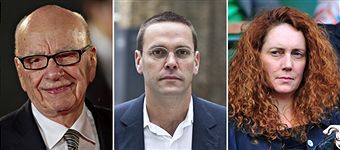 The phone hacking saga has burst back to life this afternoon, with the publication of a letter by Clive Goodman that contradicts
much of the evidence given by News International Executives to the Culture, Media and Sport Committee.
The phone hacking saga has burst back to life this afternoon, with the publication of a letter by Clive Goodman that contradicts
much of the evidence given by News International Executives to the Culture, Media and Sport Committee.
Goodman’s letter (which you can read here) , apparently written on 2 March 2007, states that phone hacking was widely discussed in editorial meetings at the News of the World and that senior executives were informed of the practice, contrary to their protestations that Goodman was a lone rogue reporter. Goodman alleges that Andy Coulson banned references to phone hacking in meetings and then offered to save Goodman’s job if the disgraced reporter did not implicate the paper during his trial. Goodman also alleges that Les Hinton, Rupert Murdoch’s point-man, saw a copy of the letter and did not act on it. Just days after supposedly seeing the letter, Hinton gave evidence to the committee on 6 March 2007 and said that he “believed [Goodman] was the only person” hacking phones.
It must be stressed that these allegations have not been tested by a court, but their emergence requires further comment from Andy Coulson, Rebekah Brooks and so forth. Earlier this morning, the select committee called for written answers from Coulson and Brooks.
Which brings us to the Murdochs. They are directly implicated by new allegations. In a separate letter, the law firm Harbottle and Lewis variously describes their evidence
to the Committee as “hard to credit” and “self-serving”, adding that they were instructed to advise on the original Goodman case not
“general” criminality at the News of the World, as has been suggested by some News International executives ( from Question 339) in the past. In another letter to the committee, News International’s former chief in-house lawyer,
Jonathan Chapman, says that the Harbottle and Lewis investigation was never intended to be a “general inquiry“. He also adds:
‘None of them (the Murdochs and Rebekah Brooks) has any first-hand knowledge whatosever of the circumstances of the 2007 Email Review, so they must have been wholly reliant on what they were
told about this by others. Regrettably, this has, in my opinion, led to serious inaccuracies in what the Committee has been told.’
This suggests that senior News International executives might have been misled by more junior functionaries, especially after James Murdoch took over the reins on 7 December 2007. For his part, James Murdoch is sticking by the oral evidence he gave. In a gigantic letter to the committee dated 11 August 2011, he reiterates that the Harbottle and Lewis material “could not be relied on any more” by News International, due to the fact that “wrong-doing at the News of the World did spread beyond Mr Goodman“. Again, this implies that senior executives may have been misled by more junior directors, who could have mispresented the conclusions of Harbottle and Lewis’ investigations to enable them to claim that Goodman was the paper’s sole rogue reporter.
Murdoch also denies a seperate allegation, made by Tom Crone, that he knew of* the infamous ‘For Neville’ email in 2008, saying that “neither Mr Myler nor Mr Crone told me that wrongdoing extended beyond Mr Goodman or Mr Mucaire.” Myler and Crone made clear last month that they disagree with Murdoch’s version of events and are likely to give further evidence to the committee.
Committeemen Tom Watson and John Whittingdale gave a statement earlier this morning in which they said that they have not “drawn a conclusion” on whether James Murdoch misled the committee, but confirmed that it was likely he would be recalled to give further evidence and clarification. It should be noted that the very fact these documents have emerged implies that News International will co-operate fully, resisting the temptation to cover-up. This saga could be entering a new chapter as a result.
Even as I write, the political campaign is being renewed, with Ed Miliband insisting that David Cameron should have taken action on Coulson earlier. Certainly, these revelations revive the embarrassment that Cameron has felt throughout this affair; but the PM should be feeling relatively secure. His statement to parliament before the recess was pugnacious and he distanced himself from Coulson. He also made clear that if Coulson were proved to have misled parliament, the police, a court and the government, then he would be leading the condemnations. Until such an event though, Cameron said that it was right that Coulson et al should be presumed innocent. It would be wrong, in objective legal terms, to disagree that view.
*Interestingly, Crone cannot be sure if Murdoch physically saw the document. He writes: “I do not recall if I produced it and showed him copy of it.” There are further points of confusion too.He says: “It may be important to note, also, that the dosument was not referred to or described as “for Neville” or as a “for Neville document”. Clarification will have to be sought.






Comments